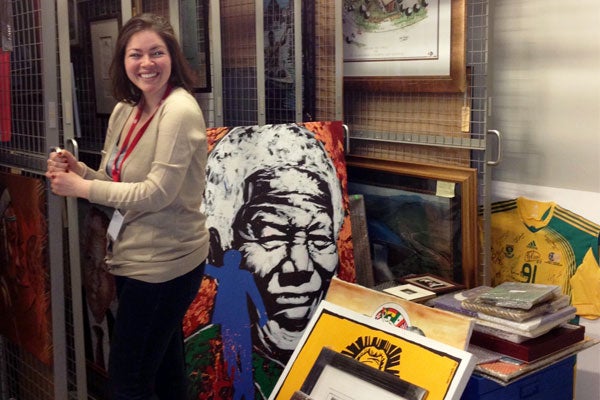
Summer internship at the Nelson Mandela Memory Centre
Published: July 15, 2013
Since 2006, the Nelson Mandela Centre of Memory has chosen at least one student from the master’s program at the University of Toronto’s Faculty of Information, or iSchool, to work as a summer intern in Johannesburg, South Africa.
Supported by Manulife Financial, the internship helps students gain archival training and experience. (Read more about the Nelson Mandela Centre of Memory.)
This summer, iSchool student Lauren Kilgour was chosen to work on four projects at the Centre, from May until August. Her responsibilities are: supporting the Centre’s digitization project with Google, with a particular focus on the 46664 photo exhibition collection; capturing metadata for Mandela’s private papers; assisting with the maintenance of the Nelson Mandela Gift Collection database; and helping to prepare the physical Centre of Memory for its launch as a public facility in September or October 2013.
“Working at the Nelson Mandela Centre of Memory is an experience that is proving both deeply rewarding and transformative,” says Kilgour. (Follow Kilgour's blog about her internship.)
Kilgour has her own academic and professional goals while in South Africa. She blogs about memory’s shifting infrastructure and scale, with a focus on memories that get produced and circulated at truly global scales. Specifically, she hopes to investigate how “confluences of people, information and technology are involved in memory production and circulation.”
After visiting the Hector Pieterson Museum and the Apartheid Museum, she reflects: “I’m increasingly struck by the very creative and innovative use of technology that I’m seeing in these institutional memory settings.”
(See photos by Kilgour posted on Flickr.)
Over the summer, Kilgour expects her experiences working at the Centre and living in Johannesburg will help her examine questions such as how does collaboration affect the formation of memory practices? How does increasing global information access influence the nature and development of memory practices and how does the use of analog or digital technologies affect memory practices, institutionally and in the public realm?
A Master of Information student in the Archives and Records Management concentration, Kilgour is entering her second year this fall. Her research explores the theoretical, social and cultural dimensions of information and record-keeping practices in public and institutional contexts.
Within this wider area of focus, her primary research project draws upon her background working at a Canadian non-profit, the National Pardon Centre, and volunteering with the Toronto-based literacy program for at-risk youth, Frontier College’s Beat the Street, to critically examine the role that criminal records play in offenders’ lives.
Upon completion of her Master of Information degree, Lauren hopes to pursue doctoral study, where she can expand the research and training undertaken during her Masters to explore the nature of the relationship between people, information and technology. She would like to share the outcomes of her research and training with the larger public community in equitable and conscientious partnerships and collaborative projects and activities.
Kathleen O'Brien is a writer with the Faculty of Information at the University of Toronto.



